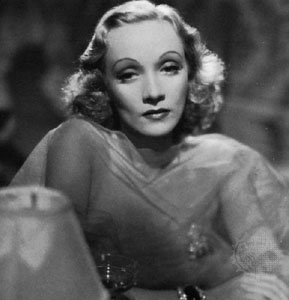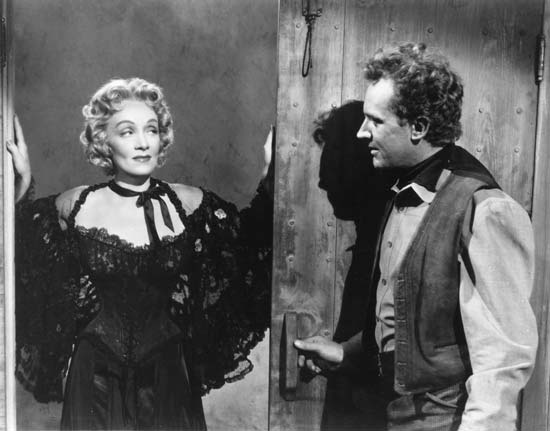Dietrich, Marlene
German-American actress
original name Marie Magdalene Dietrich, also called Marie Magdalene von Losch
born December 27, 1901, Schöneberg (now in Berlin), Germany
died May 6, 1992, Paris, France
 German American motion-picture actress whose beauty, voice, aura of sophistication, and languid sensuality made her one of the world's most glamorous film stars.
German American motion-picture actress whose beauty, voice, aura of sophistication, and languid sensuality made her one of the world's most glamorous film stars.Dietrich's father, Ludwig Dietrich, a Royal Prussian police officer, died when she was very young, and her mother remarried a cavalry officer, Edouard von Losch. Marlene, who as a girl adopted the compressed form of her first and middle names, studied at a private school and learned both English and French by age 12. As a teenager she studied to be a concert violinist, but her initiation into the nightlife of Weimar Berlin—with its cabarets and notorious demimonde—made the life of a classical musician unappealing to her. She pretended to have injured her wrist and was forced to seek other jobs acting and modeling to help make ends meet.
In 1921 Dietrich enrolled in Max Reinhardt (Reinhardt, Max)'s Deutsche Theaterschule, and she eventually joined Reinhardt's theatre company. In 1923 she attracted the attention of Rudolf Sieber, a casting director at UFA film studios, who began casting her in small film roles. She and Sieber married the following year, and, after the birth of their daughter, Maria, Dietrich returned to work on the stage and in films. Although they did not divorce for decades, the couple separated in 1929.

 That same year, director Josef von Sternberg (Sternberg, Josef von) first laid eyes on Dietrich and cast her as Lola-Lola, the sultry and world-weary female lead in Der blaue Engel (1930; The Blue Angel), Germany's first talking film. The film's success catapulted Dietrich to stardom. Von Sternberg took her to the United States and signed her with Paramount Pictures (Paramount Pictures Corporation). With von Sternberg's help, Dietrich began to develop her legend by cultivating a femme fatale film persona in several von Sternberg vehicles that followed—Morocco (1930), Dishonored (1931), Shanghai Express (1932), Blonde Venus (1932), The Scarlet Empress (1934), and The Devil Is a Woman (1935). She showed a lighter side in Desire (1936), directed by Frank Borzage (Borzage, Frank), and Destry Rides Again (1939).
That same year, director Josef von Sternberg (Sternberg, Josef von) first laid eyes on Dietrich and cast her as Lola-Lola, the sultry and world-weary female lead in Der blaue Engel (1930; The Blue Angel), Germany's first talking film. The film's success catapulted Dietrich to stardom. Von Sternberg took her to the United States and signed her with Paramount Pictures (Paramount Pictures Corporation). With von Sternberg's help, Dietrich began to develop her legend by cultivating a femme fatale film persona in several von Sternberg vehicles that followed—Morocco (1930), Dishonored (1931), Shanghai Express (1932), Blonde Venus (1932), The Scarlet Empress (1934), and The Devil Is a Woman (1935). She showed a lighter side in Desire (1936), directed by Frank Borzage (Borzage, Frank), and Destry Rides Again (1939).During the Third Reich and despite Adolf Hitler's personal requests, Dietrich refused to work in Germany, and her films were temporarily banned there. Renouncing Nazism (“Hitler is an idiot,” she stated in one wartime interview), Dietrich was branded a traitor in Germany; she was spat upon by Nazi supporters carrying banners that read “Go home Marlene” during her visit to Berlin in 1960. (In 2001, on the 100th anniversary of her birth, the city issued a formal apology for the incident.) Having become a U.S. citizen in 1937, she made more than 500 personal appearances before Allied troops from 1943 to 1946. She later said “America took me into her bosom when I no longer had a native country worthy of the name, but in my heart I am German—German in my soul.”
 After the war, Dietrich continued to make successful films, such as A Foreign Affair (1948), The Monte Carlo Story (1956), Witness for the Prosecution (1957), Touch of Evil (1958), and Judgment at Nuremberg (1961). She was also a popular nightclub performer and gave her last stage performance in 1974. After a period of retirement from the screen, she appeared in the film Just a Gigolo (1978). The documentary film Marlene, a review of her life and career, which included a voice-over interview of the star by Maximilian Schell, was released in 1986. Her autobiography, Ich bin, Gott sei Dank, Berlinerin (“I Am, Thank God, a Berliner”; Eng. trans. Marlene), was published in 1987. Eight years after her death, a collection of her film costumes, recordings, written documents, photographs, and other personal items was put on permanent display in the Berlin Film Museum (2000).
After the war, Dietrich continued to make successful films, such as A Foreign Affair (1948), The Monte Carlo Story (1956), Witness for the Prosecution (1957), Touch of Evil (1958), and Judgment at Nuremberg (1961). She was also a popular nightclub performer and gave her last stage performance in 1974. After a period of retirement from the screen, she appeared in the film Just a Gigolo (1978). The documentary film Marlene, a review of her life and career, which included a voice-over interview of the star by Maximilian Schell, was released in 1986. Her autobiography, Ich bin, Gott sei Dank, Berlinerin (“I Am, Thank God, a Berliner”; Eng. trans. Marlene), was published in 1987. Eight years after her death, a collection of her film costumes, recordings, written documents, photographs, and other personal items was put on permanent display in the Berlin Film Museum (2000).Dietrich's persona was carefully crafted, and her films (with few exceptions) were skillfully executed. Although her vocal range was not great, her memorable renditions of songs such as "Falling in Love Again," " Lili Marleen," "La Vie en rose," and "Give Me the Man" made them classics of an era. Her many affairs with both men and women were open secrets, but rather than destroying her career they seemed to enhance it. Her adoption of trousers and other mannish clothes made her a trendsetter and helped launch an American fashion style that persisted into the 21st century. In the words of the critic Kenneth Tynan: “She has sex, but no particular gender. She has the bearing of a man; the characters she plays love power and wear trousers. Her masculinity appeals to women and her sexuality to men.” But her personal magnetism went far beyond her masterful androgynous image and her glamour; another of her admirers, the writer Ernest Hemingway, said, “If she had nothing more than her voice, she could break your heart with it.”
Additional Reading
Maria Riva, Marlene Dietrich (1993), is a portrait by her daughter. Other noteworthy biographies include Malene Sheppard Skærved, Dietrich (2003); Ean Wood, Dietrich (2002); Donald Spoto, Blue Angel: The Life and Legend of Marlene Dietrich (1992); and Steven Bach, Marlene Dietrich: Life and Legend (1992). Marlene Dietrich: Her Own Song (2001) is a made-for-television documentary by her grandson.
- Louis Moreau Gottschalk
- Louis, Morris
- Louis-Nicholas Clérambault
- Louis-Nicolas Ménard
- Louis Noailles, 4e duc de
- Louis of Nassau
- Louis Orléans, duc d'
- Louis Pasteur
- Louis-Paul Cailletet
- Louis-Philippe
- Louis-Philippe, duc d' Orléans
- Louis-Philippe-Joseph, duc d' Orléans
- Louis-Philippe-Joseph Orléans, duc d'
- Louis-Philippe Orléans, duc d'
- Louis-Philippe-Robert, duc d' Orléans
- Louis-Philippe-Robert Orléans, duc d'
- Louis Raemaekers
- Louis Renault
- Louis-René de Caradeuc de La Chalotais
- Louis-René-Édouard, prince de Rohan
- Louis-René-Édouard Rohan, prince de
- Louis Riel
- Louis Saint Laurent
- Louis S.B. Leakey
- Louis-Sebastien Lenormand